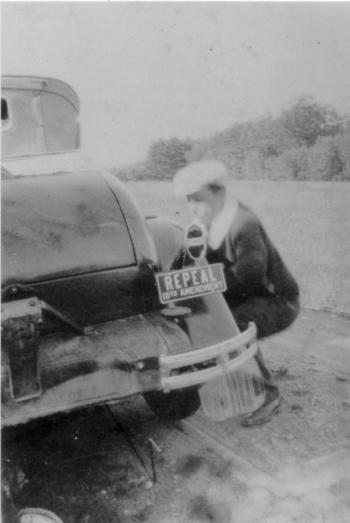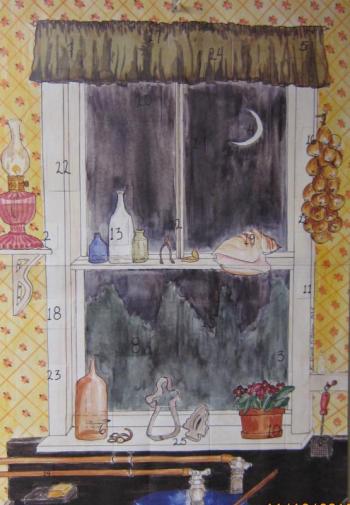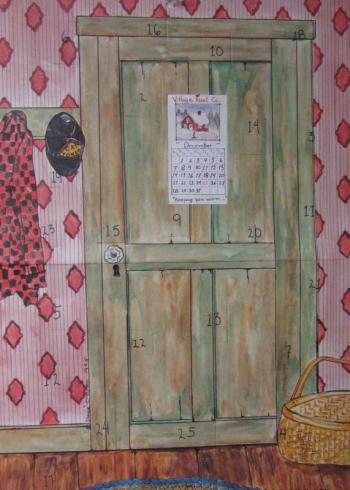This Week in Lincolnville: When Maine (and everywhere else) was Dry
This piece is adapted from Staying Put in Lincolnville, Maine
The two men on the beach peered anxiously into the dark, straining to see out onto the water. Nothing. But ears always serve better than eyes when the moon is dark. Sure enough, a faint rhythmic “plash” in the distance could be the regular dipping of an oar into the water. The taller of the two, a large, lumbering man, looked back nervously at the bridge over the Ducktrap Stream. The houses of the village were dark, no sign of either head lamps or a lantern broke the nearly total black of the night.
Now, it was obvious that the sound was made by oars; the men moved down the beach, and out of direct sight of the bridge and highway behind them. Finally, the dim shape of a boat riding low appeared out of the dense night. The lone oarsman covered the last dozen yards to the shore quickly. The bottom of the boat scraped loudly against the rocks for just a moment before the two men on shore grabbed the bow and, with tremendous effort, pulled it far up onto the rocks.
Little conversation passed between the men as they quickly unloaded the heavy wooden cases of bottles that filled the middle of the boat, then carried them to an automobile parked in the underbrush just up from the beach. They stowed some of the cases in the trunk and the rest in the back seat of the vehicle. These they covered with a blanket. Not five minutes had passed from the moment the boat first touched bottom. The three shook hands, then, as they shoved the boat off the strand, the oarsman hopped in. Almost instantly, he pulled away and disappeared into the gloom.
The two men on shore wasted no time watching him go. Now things were about to get really tense. The larger man got into the car, a large Packard, and started it up while the other gave a last look towards the bridge. Assured that all was still quiet, he climbed into the passenger seat, and they drove slowly, with headlamps off, up the narrow lane to the highway.
The occupants of the houses on Howe Point Road that night must have heard the Packard go by, yet no lamps were lit, no alarm was sounded. But then perhaps it was a common enough, middle-of-the-night occurrence, the sound of an automobile on their road that dead-ended at Ducktrap. Maybe someone stirred and rolled over, or even went to the window to see who had an errand on the beach at 2 a.m. on such a black night.
CALENDAR
TUESDAY, Nov. 19
Book group, 4-6 p.m., Library
WEDNESDAY, Nov. 20
Watercolor Journaling, 4-6 p.m., Library
THURSDAY, Nov. 21
Soup Café, Noon-1p.m., Community Building
Conservation Commission, 4 p.m., Town Office
FRIDAY, Nov. 22
An Evening of Mindfulness, 6 p.m., Library
CALENDAR
TUESDAY, Nov. 19
Book group, 4-6 p.m., Library
WEDNESDAY, Nov. 20
Watercolor Journaling, 4-6 p.m., Library
THURSDAY, Nov. 21
Soup Café, Noon-1p.m., Community Building
Conservation Commission, 4 p.m., Town Office
FRIDAY, Nov. 22
An Evening of Mindfulness, 6 p.m., Library
SATURDAY, Nov. 23
Intro to Pickleball and Open Play, 9-11 a.m., Lynx Gym, 523 Hope Road
EVERY WEEK
AA meetings, Tuesdays & Fridays at 12:15 p.m., Wednesdays & Sundays at 6 p.m., United Christian Church
Lincolnville Community Library, open Tuesdays 4-7, Wednesdays, 2-7, Fridays and Saturdays, 9 a.m.-noon. For information call 706-3896.
Soup Café, every Thursday, noon—1p.m., Community Building, Sponsored by United Christian Church. Free, though donations to the Community Building are appreciated
Schoolhouse Museum open by appointment, 505-5101 or 789-5987
Bayshore Baptist Church, Sunday School for all ages, 9:30 a.m., Worship Service at 11 a.m., Atlantic Highway
United Christian Church, Worship Service 9:30 a.m., Children’s Church during service, 18 Searsmont Road
COMING UP
Dec. 7: Christmas by the Sea
At any event, the men in the car pulled cautiously onto Atlantic Highway and drove down onto the bridge. The Ducktrap Bridge was a good deal lower in 1927, and the approaches were quite steep. Navigating more from memory than from sight, the driver downshifted, then began the ascent up the other side. He turned inland onto the sparsely-settled Cobbtown Road.
Once the last house was well behind him, he turned on the headlamps. What he saw ahead of him made his heart sink. The road appeared to deteriorate. Mud. He turned to his companion. The other man’s face registered what the driver was thinking. They never should have attempted this route after the fall rains. It was too late in the season to cross Cobbtown Road. Already they could feel the tires becoming trapped in the thick mud. A few more revolutions, and they were lost. “Damn! She’s buried herself,” the driver muttered.
We’ll leave the two hapless, would-be smugglers in the middle of Cobbtown Road on that dark night. There’s more to the tale, though, for the Packard, it turns out, was “borrowed” from the driver’s employer. That trusting summer resident had left his caretaker in charge of things, including the Packard, which probably was to have been put up on blocks for the winter. Instead, it was on its way to Augusta this dark November night, via back roads and loaded with illicit booze when it became hopelessly stuck in the mud.
Depending on whom you root for, everything turned out all right in the end. The men walked away from the car that night, returning to their homes and, no doubt, only a few hours of fitful sleep. They came back the next night with a willing farmer and his horse and wagon, loaded the cases into the wagon and hauled them out, perhaps to the Belfast Road, or perhaps they got through Cobbtown’s mud and went all the way to Hall’s Corner in Belmont. At any rate, the farmer happily went home with a couple of bottles of one hundred proof whiskey. Still another third party with a working vehicle had to be brought into the scheme to meet them and carry the load to Augusta, where they knew they could get a “long dollar” for it.
The Packard sat buried to its axles in the mud of Cobbtown Road for at most another night. With the precious liquid cargo taken care of, the nervous caretaker and his partner came back with a borrowed team of horses. They managed to pull it out, and he drove it back to its snug barn at the summer fellow’s place. We can just imagine the scrubbing and polishing that went on in that barn until the chrome shone again and the tires gleamed. It’s thought that the Packard never budged again from its winter home. As for what the summer fellow knew of its adventures, we’ll never know.
The Eighteenth Amendment to the Constitution, which took effect in 1920, prohibited the import, manufacture, sale and transportation of alcoholic beverages in the United States. Maine, which, in 1846, had passed the first state law prohibiting the sale of alcohol in the country, was an old hand at getting around prohibition.
In 1900, the Maine State Grange urged more rigid enforcement of the law, for in fact, it had never had been very enthusiastically enforced. Public sentiment by that time, tended toward regulating, not suppressing the sale of liquor. A turn-of-the-century editorial in The Republican Journal said “many believe that liquor should be had for mechanical and medicinal purposes.” Their suggestion was to round up all the rum-sellers once or twice a year and make them pay one hundred dollars to the county. Even at that early date it was recognized that enacting laws that didn’t have the public behind them only tended to bring all laws into contempt.
For example, a certain young man kept a daily diary from 1871 until he died in 1940. He recorded the chores at his family’s farm, 2078 Belfast Road; the entries often ended with his evening activities. Most nights these included a trip to ‘The Corner’ where he generally bought ‘candy’, always noting how much he spent on it, at a certain establishment, the building still called the California House today. A 23-year-old buying candy every night while visiting his buddies at what was then a roadhouse? Meanwhile, his sisters were praising him in letters for his temperance stand.
When the Eighteenth Amendment arrived in 1920, certain Mainers were ready. The state’s long, broken coastline with its hundreds of islands, secluded coves and beaches made it a perfect entry point for smugglers. Add to that a population of boat-owning fishermen, and a poor year-round coastal economy, and, well, what did they expect?
A “mother ship”, loaded with spirits, would anchor outside the twelve-mile limit, out of the reach of the U.S. Customs Patrol. The trick was to ferry the cargo from these mother ships to the shore without being spotted by the feds’ boats, fast vessels that were stationed all along the coast—Eastport, Jonesport, Bar Harbor, Rockland, Boothbay and Portland.
The rum-runners painted their narrow, shallow-draft boats black to make them less visible at night. These boats were powered by as many as three engines, including on some, surplus World War I Liberty airplane engines. They were fast, and they needed to be. Their captains were local men, as familiar with the coastline as the captains of the Customs Patrol boats; most likely they even knew one another. A cat and mouse game was often played among the islands and thoroughfares off the coast between the feds and the rum-runners. Slower vessels such as lobster boats, pleasure boats and other nondescript craft might deliver the stuff to shore, though they were more often caught
Waiting in the dark on secluded beaches and hidden coves were the men who took the illicit cargo to its next destination—those who would resell it to the thirsty public. Lincolnville Beach was, on occasion, a landing spot for rum-runners. An Islesboro man regularly delivered cases of liquor to the Beach. One night, when his mainland associate didn’t appear, he hid the stuff behind a small building near the present Ferry dock. A couple of local teenagers came along and found it. Many years later one of them revealed that they took one of the bottles and hid it in the woods of Sleepy Hollow, a mile up the Beach Road. He never said if they tried it.
Ducktrap, in spite of its proximity to Atlantic Highway, the major state road through the area, nevertheless met the qualifications of a secluded cove. Those who lived along the shore had to have been well aware that fast, dark boats were landing in the night and that certain vehicles had urgent business at the shore on those nights. Perhaps an occasional bottle passed hands along the road, ensuring that the householders slept soundly.
Are there other stories about rum-running on our coast? Let me know!
Town
Apparently the town of Northport is looking for its World War II memorial. It was last displayed where Wentworth’s Grocery Store is today, which of course, is on the site of the old Nealy store. The memorial would have predated Nealy’s. It’s believed to have ended up in Lincolnville. Does anyone have any knowledge of this, or remember this memorial? Contact Dave Kinney at the Town Office if you do, 763-3555.
School
LCS will be closed Thanksgiving week, Nov. 25-29.
Library
This Tuesday, Nov. 19, 6 p.m. the book group will be discussing Julia Phillips’ "Disappearing Earth", a mystery about a kidnapping in the Kamchatka peninsula, a remote region of eastern Russia. As always, even if you haven’t read the book, everyone’s welcome to join the group and learn about it.
Wednesday, Nov. 20, 4-6 p.m., is Watercolor Journaling. Drop in, bring your supplies, visit, paint, share. Everyone is invited, no expertise required. This is a relaxing time to be creative and to get inspiration and tips from others.
Friday, Nov. 22, 6 p.m. "An Evening of Mindfulness" will introduce attendants to the practice of mindfulness and how it can strengthen the mind’s focus and help to develop self-compassion. Ning, who is originally from Thailand and now lives in Lincolnville, will lead the group in some guided meditations. She grew up practicing mindfulness and has also trained in the United States.
This is a free opportunity for both beginners and those with experience in practicing mindfulness and meditation to spend time learning and relaxing before the busy holiday season.
Christmas in a Maine Farmhouse Advent Calendars
November was the month when I always made Advent calendars for my children, and later for their children. The top was always some familiar scene: our house, our garden in winter, one year the barn loft, another year Ducktrap, etc. Behind the windows would be little paintings of the family or the pets or something fanciful, a family of elves or the little witch I used to tell them lived in our woods. A big hit with one set of grandchildren was the window that opened up on their dad sitting on the toilet with his computer in his lap.
Now it’s again time to send out an Advent calendar to all our far-flung grandchildren, nieces, nephews, or even adult children. I have three styles (The Corner Cupboard, The Kitchen Window, and The Pantry Door) that I painted many years ago and, with a Hancock County friend, had printed at the Ellsworth American, a newspaper that’s still going strong.
Apparently, after printing the six original paintings (the front three designs and the three sheets of “surprises” that go behind the little windows) the windows were cut with a special template they had made, and the folks in that office glued them together in their spare time! All of that sounds like it would be done in China today.
They even printed up special envelopes with a clear window, a different one for the three styles. It’s an envelope that can go through the mail. They’re $15 each or $20 if I ship them. Stop by Sleepy Hollow, 217 Beach Road, or email me to get one.
Wonderful Mary Poppins
Once again CHRHS has put on an amazing musical production, and this year two current LCS students had featured roles: sixth grader Addie Harbaugh and seventh grader Maren Kinney played Michael and Jane Banks, respectively, the children with the good fortune to have Mary Poppins for their nanny. Bentley Watts was a perfect “Bert”, the male lead. How his grandparents, Jackie and Maurice, would have enjoyed seeing what an accomplished performer he is! By the way, the fellow at the top of this story with the “Repeal” sign on his car, Ivan Young, is Bradlee’s great-grandfather. And in the alternate cast Wesley Henderson played Bert and Preston Henderson was Michael Banks, both boys homeschooled and living in Lincolnville. Kevin Bergelin, who was in several LCS plays, including Beauty and the Beast and Lion King, was the most excellent Mr. Banks, Abi Hammond appeared in multiple roles as did sophomore Izzie Kinney and Ellie Silverio, the dancing ballerina and all the other dance numbers.
Not only did the large cast have to master a very credible British accent, but learn all the songs (and how to sing and mime “supercalifragilisticexpialidotious” backwards and forwards!), and the many dance numbers. The back stage crew handled a most complicated-appearing set, and there was even flying! After all, Mary Poppins comes and goes with the change in the wind. The orchestra included Lincolnville’s conductor Kim Murphy, clairinetist Glen Sargeant, and flutist Maho Hisakawa (I know, she lives in Camden now, but I still miss her!)


























